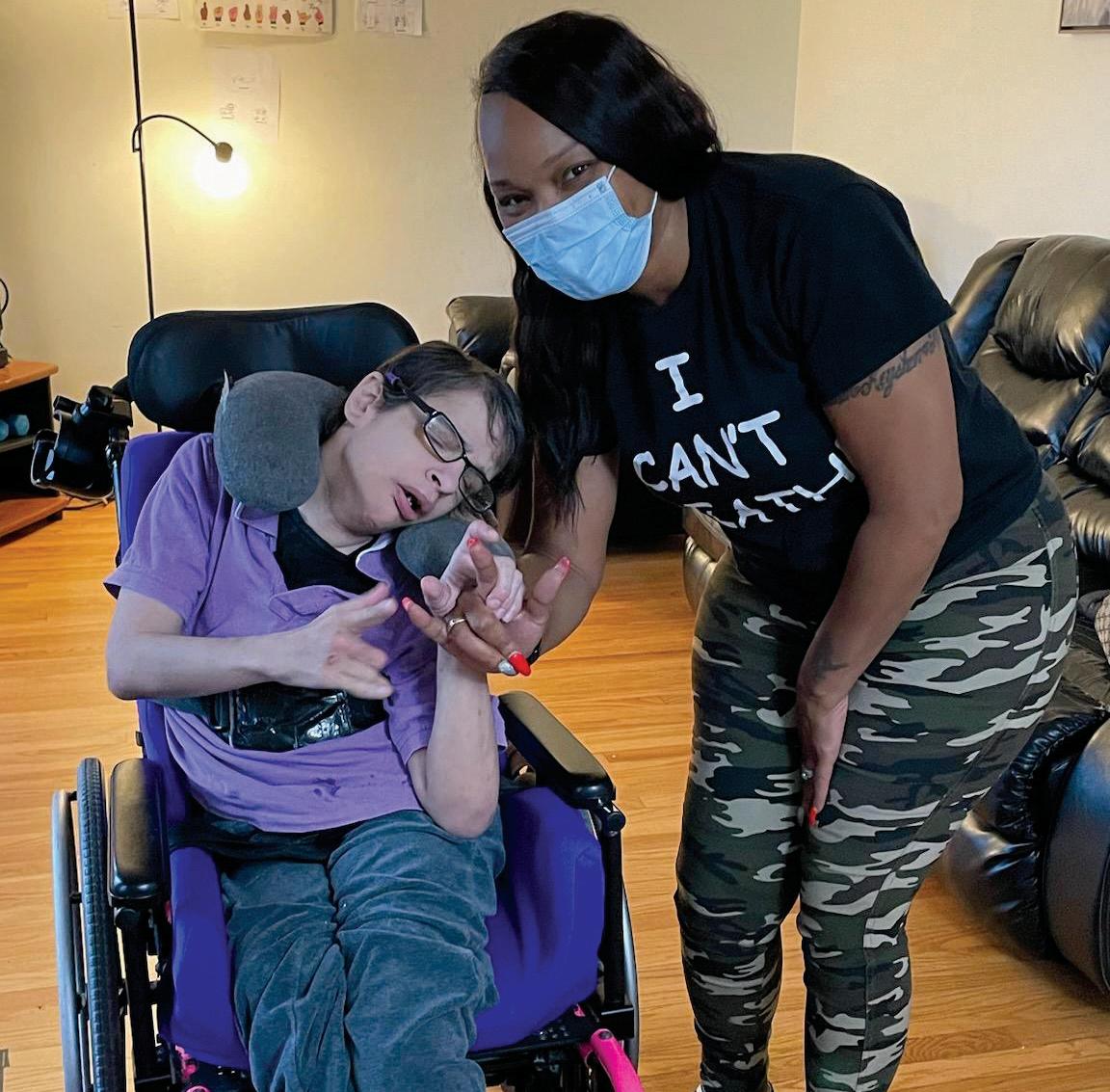
4 minute read
A
Modern-Day Miracle Worker Celebrated for Her Evolving and Empathetic Care
“Alone we can do little, together we can do much.” This well-known quote from Helen Keller has no doubt moved many. But for McKisha Davis, Helen and Anne Sullivan’s legacy also changed the trajectory of her life. It also inspired a career helping and advocating for those with physical and mental disabilities whose voice is often silenced.
McKisha enrolled in sign language classes and voluntarily transferred from a leadership position to specifically work with Maya, a member with deafblindness and cerebral palsy. Inspired by Helen Keller’s teacher Annie Sullivan, she strives everyday to give Maya the care she would want for her own family.
McKisha is one of more than 400 compassionate direct service professionals (DSPs) at Envision Unlimited who support our 3,000 members and caregivers year-round. Every day, every time, McKisha and her peers are committed to serving individuals with intellectual, developmental and psychiatric disabilities. They serve as mentors and coaches for members in our group homes (CILAs), day centers, mental health facilities and their own homes to support members, keep them safe, encourage them to be more independent, and help them reach their highest potential.
To prepare for her role as Maya’s caregiver, McKisha also worked closely with Maya’s mother to get to know Maya’s likes and dislikes, going above and beyond her role assisting with daily living activities such as bathing and dressing, shopping, laundry, and cooking. DSPs also accompany members on appointments and make commuting arrangements. They are trained to administer medications, take vital signs, and monitor overall member well-being.
“We have some members with limited or no language skills, so we are their voice,” said Donna Ennis, Vice President of Community Living, Home Based, and In-Home Respite Services.
Maya’s mother, Faye Manaster, shared: “McKisha definitely stands out as a DSP who is dedicated to supporting people in her care. She’s responsible, reliable, and a good problem solver. She continues to learn and improve her sign language skills independently, which is an absolute necessity to communicate effectively with my daughter.”
McKisha was spotlighted by Envision Unlimited during DSP Appreciation Week for the work she says has created “great rewards for me personally.”
Since childhood, she has been inspired by the care Anne Sullivan gave to Helen Keller. “Their story made me want to take sign language classes and to specifically work with Maya,” she said. “Maya has changed my life.” after diagnosis, added Gender-Walters.
Determined to play a critical role and provide empathetic and innovative services for families raising children with autism spectrum disorder, Envision Unlimited is embracing those families and taking action to break barriers and make a lasting difference.
“We want to provide meaningful care and new hope for these families,” said Danielle Gender-Walters, Ph.D., BCBA-D, Director of the Behavior Analysis Department.
But as more children are diagnosed with autism spectrum disorder, Envision Unlimited is disrupting the space. Our organization’s ABA Therapy Program is aggressively moving to provide resources to Chicagoland families. Research shows that the earlier children receive therapy, the better their outcomes in life. In 2021, the Centers for Disease Control and Prevention reported that one in 44 children were diagnosed with autism spectrum disorder, an increase from the early 2010s when it was one in 68.
Through the Applied Behavioral Analysis (ABA) Therapy Program, Envision Unlimited is disrupting the cycle. The organization is poised to significantly increase the numbers of families receiving this highly individualized and impactful care, thanks to its creative solutions in finding ways for families to access services due to complicated legislative requirements and insurance obstacles.
Historically, families raising children with autism — or searching for a proper diagnosis — have been on a waiting list and struggled for better access to behavioral health care because of expensive therapy solutions and a fragmented and polarized insurance landscape. Compounding the challenges, there is concern that children from Black and Latinx homes are not diagnosed early enough-and do not have convenient access to therapy
Last year we saw a breakthrough as Illinois legislation will pave the way for increased access to our ABA Therapy program. The law created more provider options by adding Medicaid coverage for this new type of treatment. While waiting for this to go into effect, Envision Unlimited already is seeing an increase in referrals by meeting Medicaid requirements that most providers have not been able to do.
“This has been significant for those families with great barriers to care,” said GenderWalter, explaining that “many of our South Side neighbors have been especially hard hit.” Giving hope, support, and paths of progress for children and their families living with autism and related disorders is the goal. The Envision Unlimited program is created to be convenient for all families through one-onone in-home and virtual online sessions with children and training for their caregivers.
In the midst of a mental health crisis, Envision Unlimited continues to step up with new, unique ways to cultivate resources and build better mental wellness for an often-overlooked population of people with disabilities.
With our comprehensive, individualized approach, clients with serious and persistent mental illness living in long-term care facilities and nursing homes are making significant transitions. Over the last year, 78 transitioned to the community from institutional settings, doubling the number of individuals served.
“We’ve played a key role in the State’s strategic plan for deinstitutionalization of the mental health system,” said Envision Unlimited President and CEO Mark McHugh. “With services including housing assistance, clients can return to their communities where they can lead healthy and productive lives.”
Consider these breakthroughs:
• Trauma-informed mental health services for our most vulnerable neighbors who have experienced home or community violence.
• Mental health services now available for families in Chicago Public Schools and women through integrated living community-based programs.
• An expanded safety net for people with no







